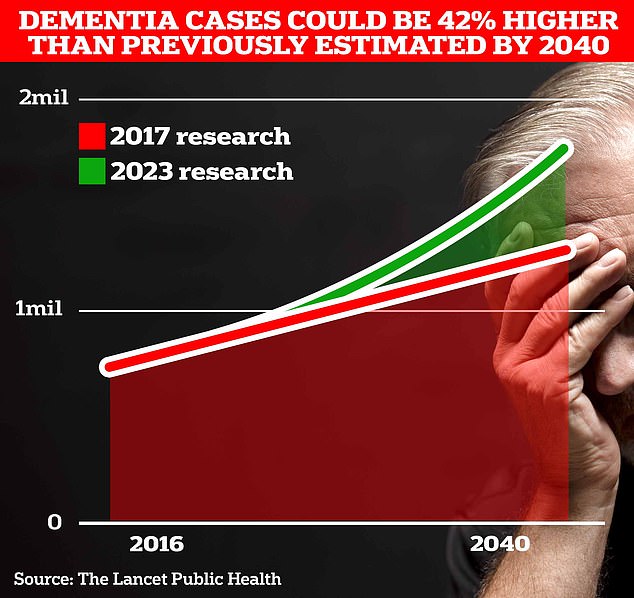Eating a diet high in junk food could harm the brain within days and increase the risk of dementia, new research suggests.
Ultra-processed foods (UPFs) such as biscuits, crisps and ready-made snacks already make up a growing share of everyday diets.
But a study by the University of North Carolina School of Medicine, published in Neuron, found regularly consuming these foods impaired memory and disrupted key brain cells—a process that could raise the risk of Alzheimer’s and other forms of dementia.
Scientists said a Western-style diet rich in saturated fat—the equivalent of cheeseburgers and chips—altered the hippocampus, the brain’s memory centre.
Tests on mice revealed that after just four days of a high-fat diet, hippocampal cells known as CCK interneurons became overactive and unable to process glucose properly.
The resulting disruption to memory pathways may help explain how poor diet contributes to cognitive decline.
Around 944,000 people in Britain are currently living with dementia, a figure projected to rise to 1.7million within two decades. In the US, seven million people are affected. Alzheimer’s disease accounts for around six in ten cases.
Encouragingly, the researchers found that restoring normal access to glucose—either through fasting or by changing diet—calmed the neurons and reversed memory problems.

High-fat junk foods have a detrimental effect on the brain almost immediately, found the researchers

Around 900,000 Brits are currently thought to have the memory-robbing disorder. But University College London scientists estimate this will rise to 1.7million within two decades as people live longer. It marks a 40 per cent uptick on the previous forecast in 2017
They saw that once the mice’s high-fat diet was withdrawn, they no longer struggled with memory tests.
Lead researcher Juan Song said: ‘We knew that diet and metabolism could affect brain health, but we didn’t expect to find such a specific and vulnerable group of brain cells, CCK interneurons in the hippocampus, that were directly disrupted by short-term high-fat diet exposure.
‘What surprised us most was how quickly these cells changed their activity in response to reduced glucose availability, and how this shift alone was enough to impair memory.
‘This work highlights how what we eat can rapidly affect brain health and how early interventions, whether through fasting or medicine, could protect memory and lower the risk of long-term cognitive problems linked to obesity and metabolic disorders.
‘In the long run, such strategies could help reduce the growing burden of dementia and Alzheimer’s linked to metabolic disorders, offering more holistic care that addresses both body and brain.’
Previous studies suggest healthy eating habits—such as diets rich in fish, pulses and vegetables—can delay dementia by as much as 25 per cent.
British scientists recently found that sticking to such a regime between the ages of 48 and 70 boosted activity in areas of the brain that decline before diagnosis.
Last year, a landmark paper in The Lancet also suggested almost half of Alzheimer’s cases worldwide could be prevented by tackling 14 risk factors, including high cholesterol and vision loss.
Other factors highlighted were poor education in early life, hearing loss, head injuries, high blood pressure, heavy drinking, obesity, smoking, depression, social isolation, lack of exercise, diabetes and air pollution.
Experts said addressing these issues through healthier lifestyles, better healthcare and social support could delay or even prevent millions of dementia cases globally.
Research suggests dementia is already the UK’s biggest killer, causing more deaths each year than heart disease or stroke.
The Alzheimer’s Society warns the number of people affected will more than double to 1.6million by 2040, driven largely by longer life expectancy.
Globally, cases are expected to more than triple to over 150million by 2050.
While there is currently no cure, a new generation of drugs offers hope of slowing progression in the early stages of Alzheimer’s.
Doctors stress that getting a timely diagnosis is vital, so patients and families can access treatment and support as soon as possible.
A landmark study published in summer 2024 also suggested almost half of all Alzheimer’s cases could be prevented by tackling 14 lifestyle factors.
World-leading experts found two health problems—high cholesterol and vision loss— were, combined, behind almost one in ten dementia cases globally.
They join 12 other factors, ranging from genetics to smoking status, that experts have identified as increasing the risk a person will suffer dementia.
Experts claimed the study, published in the prestigious journal The Lancet, provided more hope than ‘ever before’ that the memory-robbing disorder that blights the lives of millions can be prevented.












